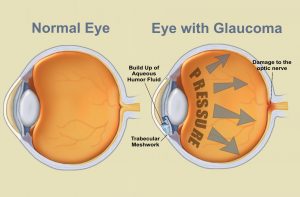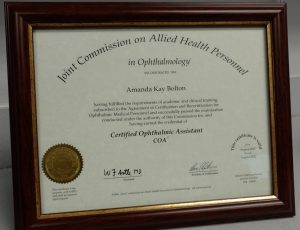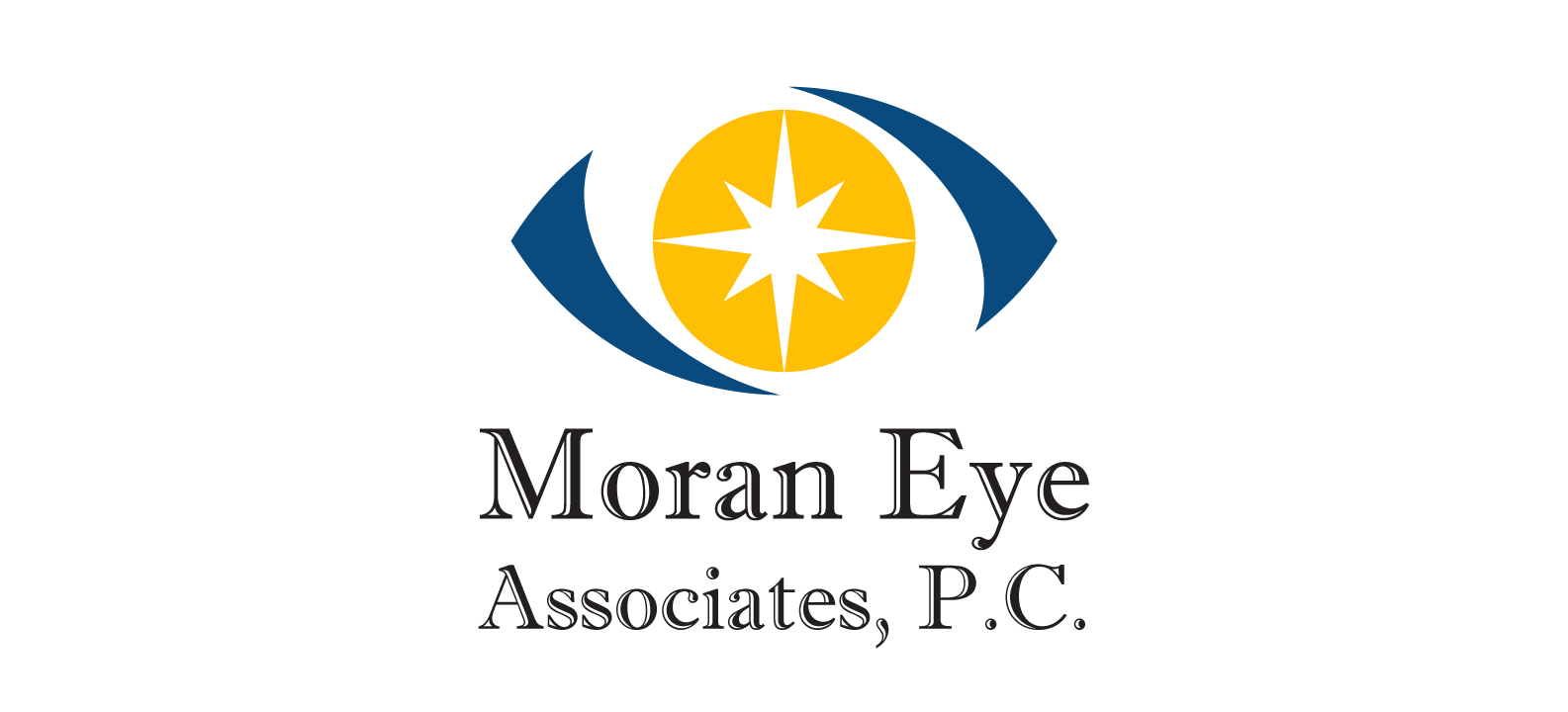by Dr. M | Nov 24, 2017 | Appointment, Exam, Glaucoma, Medical Eye Care, Patient Care
Glaucoma is known as the “Silent Thief of Sight” because it can begin to rob you of your sight before you notice any symptoms.

Regular exams are essential!
Regular eye exams are your best defense against the early detection and treatment of glaucoma. At each visit, we will check your eye pressure, and Dr. Moran will look at the back of your eye to examine the health of the optic nerve. These important tests can detect the start of glaucoma, and get you started on a simple treatment therapy that can save your sight.
Know if you are at risk.
According to the Glaucoma Research Foundation, people in these categories are at higher risk for developing glaucoma.
Age 60 or Older: Glaucoma is much more common among older people. You are six times more likely to get glaucoma if you are over 60 years old.
Family History: The most common type of glaucoma, primary open-angle glaucoma, is hereditary. If members of your immediate family have glaucoma, you are four to nine times higher to develop this disease.
African Descent: Glaucoma is six to eight times more common in African-Americans than in Caucasians.
Hispanics in Older Age Groups: Recent studies indicate that the risk for Hispanic populations is greater than those of predominantly European ancestry, and that the risk increases among Hispanics over age 60sisipisi.ccsisipisi.ccsisipisi.ccsisipisi.cc.
Asian Descent: People of Japanese descent are at higher risk for glaucoma.
You may NOT notice a change in your vision until irreversible damage is done.

Eye with glaucoma
Many people who are in the early stages of glaucoma are unaware of their condition. When vision loss becomes noticeable, glaucoma may have caused irreversible damage.
If left untreated, glaucoma will lead to blindness. Although there is no cure, medications and surgery can help slow the disease’s progression. Vision loss occurs because increased eye pressure from glaucoma can damage the optic nerve, which carries images from the eye to the brain.
Don’t delay. Early detection and treatment is the best way to manage your condition. Dr. Moran may prescribe eye drops, which, when used daily, may be all that you need to keep your eyes healthy. If prescription eye drops are not sufficient to control your glaucoma, laser treatment or surgery may be an option.
Monitoring your progress: In addition to an eye exam, Dr. Moran may request additional tests. Glaucoma patients are monitored using annual visual field and OCT tests. Changes in your test results may indicate a need for an update in your treatment plan.
To learn more about this disease, visit the Glaucoma Research Foundation GRF.
by Dr. M | Nov 7, 2017 | Donate, Eyeglasses, Glasses, Medical Eye Care, Office
 You can change lives by donating your used eyeglasses – RECYCLE for SIGHT!
You can change lives by donating your used eyeglasses – RECYCLE for SIGHT!

We have a donation box in our office!
Moran Eye Associates is working with the local Lions Club to collect eyeglasses to distribute to those in need. Dr. Mark Moran and his wife, Paulette are Lions Club members. They encourage everyone to donate their used specs.
Changing lives, one pair at a time: In almost any home, you can find a pair of eyeglasses that are no longer being used. Need a little motivation to clean out those drawers? Your donated eyeglasses can change the lives of children and adults.
For many years, the Lions Club “Recycle Your Sight” program has distributed glasses to people in need in low and middle-income communities. Donated glasses can:
Success in school: Help a child read
Work opportunities: Help an adult succeed in his or her job
Quality of life: Help a senior maintain independence

Thanks for your donation, Sherri!
We know that many of our patients no longer need their old prescription glasses. Especially those who have improved their vision through LASIK or cataract surgery with Dr. Moran!
If you have a pair (or more!) of glasses to donate, bring them to our office at 1204 Delaware Avenue in Fountain Hill. We would be happy to accept your donation during our normal office hours, 8-4pm, Monday -Thursday. Prescription glasses, reading glasses, and sunglasses are all needed.
Looking for a great community service project for your office or for student groups? This recycling program is an easy project to coordinate. Contact us for more information and to request a collection box.
Lions Club – Recycle for Sight
by Dr. M | Oct 30, 2017 | Appointment, Dilation, Exam, Medical Eye Care, Patient Care, Retina, Uncategorized
DROPS, DROPS, when does it stop?

Ocular medication for dilating and glaucoma, assorted types
Patients often ask when they come in to see Dr. Moran for a complete exam, diabetic exam or cataract recheck, “Why all these drops?” Here is the simple explanation.

The eye doctor is easier than the dentist!
Getting a comprehensive eye exam without dilation, is like going to the dentist and not opening your mouth. Sure, he can see your lips and the shape of your jaw but he’s unable to see the health of your teeth.
Dr. Moran can examine the lids, lashes, and cornea (outermost layer of your eye), but to see beyond the surface, you need the drops, drops and more drops.
Depending on your age, diagnosis and health history you may receive more drops than another. Let’s discuss someone in their 60’s with diabetes or cataracts.
First, you will receive the “yellow drop”- No your eyes will not stay that color. This drop will allow us to check the intraocular pressure of your eye (glaucoma screen). It also acts as a mild numbing agent.
Next, you will receive a Phenylephrine drop. This is the drop which will dilate your pupil and allow Dr. Moran to see into the depths of the eye and examine the retina.
Lastly, comes the Mydriatic drop which paralyzes the iris muscle to keep the eye dilated for the duration of the examination.
That’s the answer to why all the drops. Now when will it STOP?
Usually, dilation lasts from 4-6 hours. It will affect your ability to work close-up and you will be sensitive to light. Blue eyes tend to stay dilated longer. It is not unusual for some patients to remain dilated for more than 6 hours, but dilation is not harmful to the eye.

You can drive if you are comfortable doing so. We recommend dark sunglasses and will provide you with them if you forget to bring yours.
Although being dilated can be an inconvenience, the benefit significantly outweighs the hassle.
Schedule your DILATED eye examination by calling or texting our office at 610-628-2022, we look forward to seeing you.
Contributed by Mandy Bolton, COA
by Dr. M | Oct 24, 2017 | Education, Experience, Mark Moran, Patient Care
 Mark E. Moran, D.O., M.S.H.I., F.A.O.C.O
Mark E. Moran, D.O., M.S.H.I., F.A.O.C.O
Dr. Mark Moran has added another degree to his already impressive set of academic accomplishments. He recently completed a Master of Science in Health Informatics (MSHI) at Drexel University. We are very proud of our graduate!
This area of study provides knowledge of how to use information technology efficiently and responsibly to improve health outcomes.
Dr. Moran explains why pursuing this degree was important to him.
“I’ve always had a dual career in both medicine and computers. I pursued my medical degree to allow me to practice medicine. At the same time, I continued my computer career without an official degree. The online Drexel program allowed me to formalize that computer experience, without taking time away from seeing my patients. With the integration of computers and informatics in medicine today, the two career paths have merged into one.”
As a practicing physician, Dr. Moran brought a unique first-hand perspective to his course of study. He was able to apply his knowledge directly to his practice, Moran Eye Associates, in Bethlehem, PA. Now, his patients benefit not only from his medical experience, but also from his awareness of how healthcare information can be managed and shared for better patient care.
This newly accredited Drexel program was developed with the following mission statement:
The mission of the MSHI program is to advance national healthcare goals by preparing health informatics professionals to exercise leadership in an increasingly patient-centered and data-driven environment.

Dr. Moran is a Drexel University Graduate
The program pursues this mission by offering an interdisciplinary, broad-based curriculum that encourages engagement with industry and fosters both research-based and experiential learning.
For more information on this degree program, click to visit the Drexel University website: Drexel University MSHI
by Dr. M | Sep 13, 2017 | Education, Exam, Experience, Office, Patient Care
We congratulate Mandy Bolton on achieving her Certified Ophthalmic Assistant (COA) designation!

Mandy

The COA professional certification is provided by (JCAPHO), the Joint Commission for Allied Health Personnel in Ophthalmology and is an industry-recognized achievement.
Mandy’s COA accomplishment is not her first professional achievement. She was also the first Certified Patient Services Specialist in the state of Pennsylvania, completing that program in 2013. Her educational achievements highlight her dedication to providing the best patient care.
What is a COA?
The Certified Ophthalmic Assistant (COA) is a core designation for eye care professionals on the path to success. This designation confirms an assistant’s knowledge in 19 specific content areas. The COA certification examination is three hours in length and is comprised of 200 scored multiple-choice questions.

Many hours of textbook study goes into preparation for this demanding test. Mandy was also fortunate to have hands-on experience working with patients and learning from Dr. Moran to help supplement her course of study. Dr. Moran is proud of her dedication to our practice and to our patients.
When you see Mandy, please be sure to congratulate her on her achievement!



 You can change lives by donating your used eyeglasses – RECYCLE for SIGHT!
You can change lives by donating your used eyeglasses – RECYCLE for SIGHT!




 Mark E. Moran, D.O., M.S.H.I., F.A.O.C.O
Mark E. Moran, D.O., M.S.H.I., F.A.O.C.O


